Extraordinary Times, Extraordinary People
When the COVID-19 pandemic thrust the world into an unsettling time, faculty, staff and students stepped up to make a positive difference through advocacy, volunteerism, innovation and leadership
By Crystal Mackay, MA'05
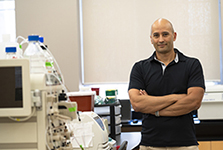 The Researcher
The Researcher
Stephen Barr, PhD
Stephen Barr is part of a team rapidly working to develop a vaccine for COVID-19, along with leading experts in virology, vaccinology and infectious diseases at Western.
With an investment of nearly $1 million from the Canadian Institutes of Health Research, the team began their work almost immediately after the World Health Organization declared COVID-19 a global pandemic.
“In the face of an outbreak like this one, putting together collaborative teams and working with other labs across the country is critically important to give Canada the greatest chance to effectively control and manage this pandemic,” said Barr.
The team’s efforts are being conducted within a Containment Level 3 lab inside the Imaging Pathogens for Knowledge Translation facility and is building off of work started by Chil-Yong Kang, PhD, who has been actively working on a vaccine for Middle East Respiratory Syndrome (MERS) based on constructs he developed for an HIV vaccine. MERS is caused by a coronavirus similar to the one that causes COVID-19.
Barr and the team are also working to develop a ‘vaccine bank’ that would contain ready-made vaccines to be used rapidly at the start of another coronavirus outbreak.
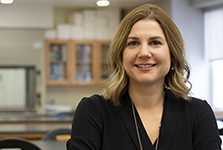 The Educator
The Educator
Nicole Campbell, PhD
With student safety a top priority, Western University made the decision to move all classes online in mid-March for the remainder of the semester. Educators were given five days to transition their courses to the online space.
As a Western University Teaching Fellow, Nicole Campbell, PhD, had already been charged with providing educational leadership to the University community through research on teaching and learning, with a focus on transparency and consistency for students. She quickly jumped at the opportunity to work with her colleagues and Bradley Urquhart, PhD’07, Associate Dean, Basic Medical Sciences, to develop resources, guides and communications to assist faculty members with the transition.
“Those five days were complete chaos, but in a really good way,” said Campbell. “We all played to our strengths and worked together to help get more than 70 courses transitioned to the online space.”
She also prepared a new template for a student-centred visual syllabus that focuses on online delivery of courses and emphasizes accessibility and equity. “There were many aspects of courses that faculty had not considered before and this was an opportunity to bring awareness to relevant issues,” she said.
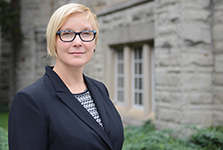 The Voice of Reason
The Voice of Reason
Greta Bauer, PhD
As pandemic response evolved locally and globally, the public and the media were searching for clear information and explanation in order to understand the virus, its spread and the risks involved.
Professor Greta Bauer, PhD, who trained as an infectious diseases epidemiologist who has shifted her research to social epidemiology, became one of the steady voices of reason lending her expertise to the media and the University and research communities.
“As epidemiologists we have an ethical obligation in this situation to provide education to the public and to other researchers who don’t have the same understanding of epidemiology,” she said.
She participated in a Western Alumni webinar about COVID-19 that attracted more than 13,000 views, spoke to the media on topics that ranged from understanding the numbers to the importance of testing and tracing, and she published an opinion piece in The New York Times explaining why intentionally catching the virus was a bad idea.
“From a public safety perspective, epidemiological education felt like an incredibly important endeavour during this time of uncertainty,” she said. “I think it is one of my strengths to be able to explain complex ideas in fairly clear ways and to pay attention to where misunderstandings might be adversely impacting the public’s health.”
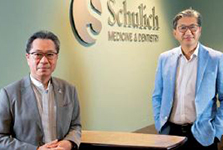 The Leaders
The Leaders
Dr. Davy Cheng
Dr. John Yoo
Dr. Davy Cheng was in the acting role of Dean when the University announced plans to move classes online and move to an essential services model. It would be only a few weeks until he would pass the baton to incoming Dean Dr. John Yoo.
Dr. Cheng took on the challenge in stride – helping to guide the School through complex issues around communications, online learning and remote work, the abrupt shutdown of research and safe delivery of care in London and Windsor. All the while keeping in mind the health and wellbeing of faculty and learners who were working on the frontlines of the pandemic.
“I was so proud of the School community who came together in this time of risk and uncertainty,” said Dr. Cheng. “It truly was a collaborative effort that enabled us to mount a successful response.”
On May 1, Dr. John Yoo took the reigns, although he had been working with Dr. Cheng collaboratively leading up to the transition.
Shortly after he took the helm, the University began its road to recovery, and Dr. Yoo led teams navigating a safe return to campus.
 The Volunteers
The Volunteers
Drs. Alysha Ahmed, Mark Cachia
and Michelle Quaye
When clinical rotations and classes were put on hold at Schulich Medicine, medical students raised their hands and answered the call to help. Drs. Alysha Ahmed, Mark Cachia and Michelle Quaye, all graduates from the Class of 2020, saw an opportunity to use their knowledge and interest in public health to aid in the public health effort, and organized and trained a group of their classmates to assist the local health unit with contact tracing and education for probable cases of COVID-19.
“I think it’s an intrinsic motivation that medical students have to want to be able to give back to the community,” said Dr. Ahmed.
In keeping with physical distancing measures, they adapted their processes to be able to work remotely, and recruited more than 50 student volunteers who were involved in contacting more than 300 probable cases in the community.
“Each day the public health unit would update their list of who had been tested for COVID-19. We used that list and assigned our volunteers to reach out to them, touch base, do contact tracing and then provide some public health guidance and education,” said Dr. Cachia.
The team was also involved in contacting long-term care and retirement homes in the region to do risk assessments, and also developed a process to collect race and income-based information about COVID-19 cases to get a more fulsome picture of the potential inequities that exist.
Drs. Ahmed, Cachia and Quaye are all moving on to residency training in Public Health.
“We really wanted to put our time, energy and skills into something that can help our community and help us get through the pandemic together,” said Dr. Quaye. “For me personally, I also saw this as a really unique learning opportunity. And while I hope it’s something that never happens again, I know this is a really important experience for me to be able to take with me through my career.”
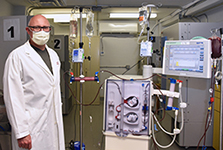 The Innovator
The Innovator
Dr. Chris Mclntyre
Seeing patients in the intensive care unit with COVID-19 and feeling helpless to be able to save them, drove Dr. Christopher McIntyre to fast-track a new way to treat patients. “This is the most horrible disease I’ve had to look after, and that became the engine to be innovative and aggressive in trying to find solutions in a way that we haven’t ever before.”
With the knowledge that the inflammatory storm caused by COVID-19 was causing multiple organ failure in patients, Dr. McIntyre, Professor in Medicine, researched ways to fight this hyperinflammation, and discovered there was a way to reprogram white bloods cells from being inflammatory to being anti-inflammatory.
In the span of less than six weeks, he and his team developed a way to alter existing dialysis machines to gently remove a patient’s blood and transform the white blood cells associated with inflammation before releasing them back into circulation.
“There is no playbook here. We couldn’t do things the way we’ve always done them,” he said. “Within 40 days of first writing down the concept, we got the machines approved through Health Canada, and treated our first patient.”
Early results of the clinical trial show that the technique is able to reduce the amount of inflammation in the body, and next they will be investigating if it also changes clinical outcomes in a meaningful way.
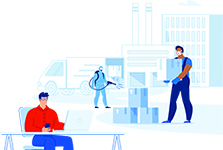 The Essential Team
The Essential Team
Wayne Baxter,
Tom Kondrak, and Mike Trela
When the rest of the University was shutting down – locking office doors to work from home, moving classes online, reducing lab work to a minimum – the team at the Dental Sciences loading dock remained at their post to help keep important University functions running.
“The Dental Sciences loading dock is much more than just dentistry,” said Rachel Halaney, Associate Director for Dentistry. “They are receiving deliveries for groups in several different buildings, including those doing research on COVID-19, and those labs truly couldn’t function without this team doing what they do.”
The team, including Wayne Baxter, Tom Kondrak and Mike Trela manage the main receiving area for important documents, and critical supplies for research including things like agents for cell cultures, coolants and supplies for animal research.
In order to safely continue their work, the team set up new safety protocols including physical distancing measures, cleaning and sanitization common areas and wearing masks and other protective equipment while on the job.
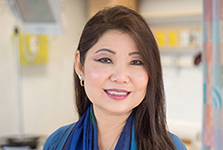 The Advocate
The Advocate
Dr. Andrea Lum
Dr. Andrea Lum was appointed Vice Dean, Faculty Affairs at Schulich Medicine & Dentistry on January 1, 2020, just months before the COVID-19 pandemic was officially declared by the World Health Organization. Dr. Lum quickly realized that with the extra stressors being placed on clinical faculty at the School, she needed to move the plans forward rapidly for a Peers for Peers support program for faculty.
Within four short weeks, Dr. Lum took the Program from concept to fruition, recruiting 17 Wellbeing Leads, who were trained to be empathetic listeners and provide support and resources to their peers.








